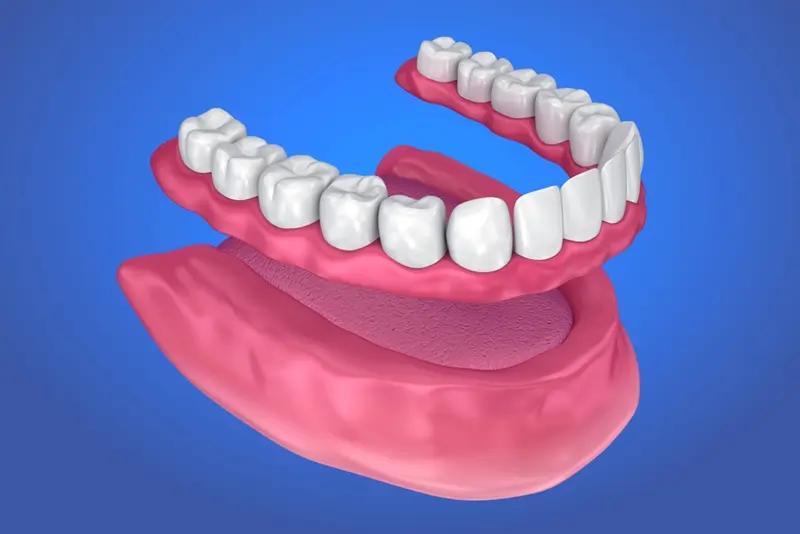Different types of dentures are used according to how many teeth a patient needs replaced and the way in which they are supported in the mouth. Existing teeth may be used to hold the dentures in position or to create a dental bridge, while implants may be installed to provide extra stability.
What is the purpose of the different types of dentures?
Complete and partial dentures
Complete dentures are an entirely new set of teeth in either the upper or lower jaw. Partial dentures replace only those that are missing, where the patient still has a number of their natural teeth.
If several teeth are missing, a partial denture may be fitted rather than multiple individual bridges or implants. It is important that missing teeth are replaced even when only a handful, so that those remaining do not misalign or drift out of position.
When are dentures fitted?
Immediate dentures
Made in advance of any existing teeth being removed, immediate dentures are positioned straight away. They allow the patient to have a full mouth of teeth while their gums heal, which is not only aesthetically pleasing but makes everyday tasks a little easier to manage.
However, a disadvantage of immediate dentures is that they require continual adjustment throughout the healing period. Bones and gums change size and shape over time, and this is especially true during recovery. For this reason, immediate dentures are usually a temporary measure until the permanent ones can be installed.
Gum tissue is given plenty of time to heal before conventional dentures are inserted.
Conventional dentures
Conventional dentures are fitted several weeks after the patient’s teeth have been removed and are their permanent replacement. Gum tissue is given plenty of time to heal before conventional dentures are inserted, which increases the possibility of them fitting correctly in the long term.
A number of jaw impressions are taken by the dentist, who then makes a model set of dentures for the patient to try out. The model allows the dentist to check for fit and colour before the permanent dentures are created. When the final dentures are fitted, adjustments are made as required.
How are dentures held in position?
Implant-retained dentures
For increased stability, a dentist may opt to use implants to hold the dentures in place. A metal rod is inserted into the jawbone, and the dentures sit on top. They are still removable so the patient can put them in and take them out as required.
Crown-supported dentures
If a patient needs several consecutive teeth replacing and still has some of their own teeth remaining, they may have a dental bridge. The teeth either side of the those being replaced are prepared by the dentist to hold false crowns. The replacements are cemented to the teeth prepared for the false crowns, which hold them in place on top of the gum.
 If a patient has lost all of their teeth in their upper or lower jaw, a complete denture could be the answer.
If a patient has lost all of their teeth in their upper or lower jaw, a complete denture could be the answer.What to know before opting for dentures
Dentures are a removable replacement option, usually taken out of the mouth overnight. Whatever kind of dentures are used, it will take time for the patient to get used to inserting and removing them and there may be some soreness while the mouth gets used to them.
As much as possible, dentures are made to match the colour and look of any remaining natural teeth so that the patient is confident in wearing them.
Some patients use denture adhesives for added security, especially where the jaw is used excessively, such as in public speaking or giving long presentations. However, if adhesive is being used as a substitute for poor fit, a dental appointment should be made.
How are they different to dental implants?
Dental implants are a more natural and long-lasting alternative to dentures. Much like implant-retained dentures, the replacement tooth is attached to a metal post that is drilled into the jaw. Implants are not removable, and the result is a stable crown which is unlikely to need replacing for a number of years.
If you are considering how to replace your missing teeth, City Dentists can help. Our team have wide-ranging experience and can advise on the best course of action for you. Call us on 04 978 4964 or book an appointment online.
